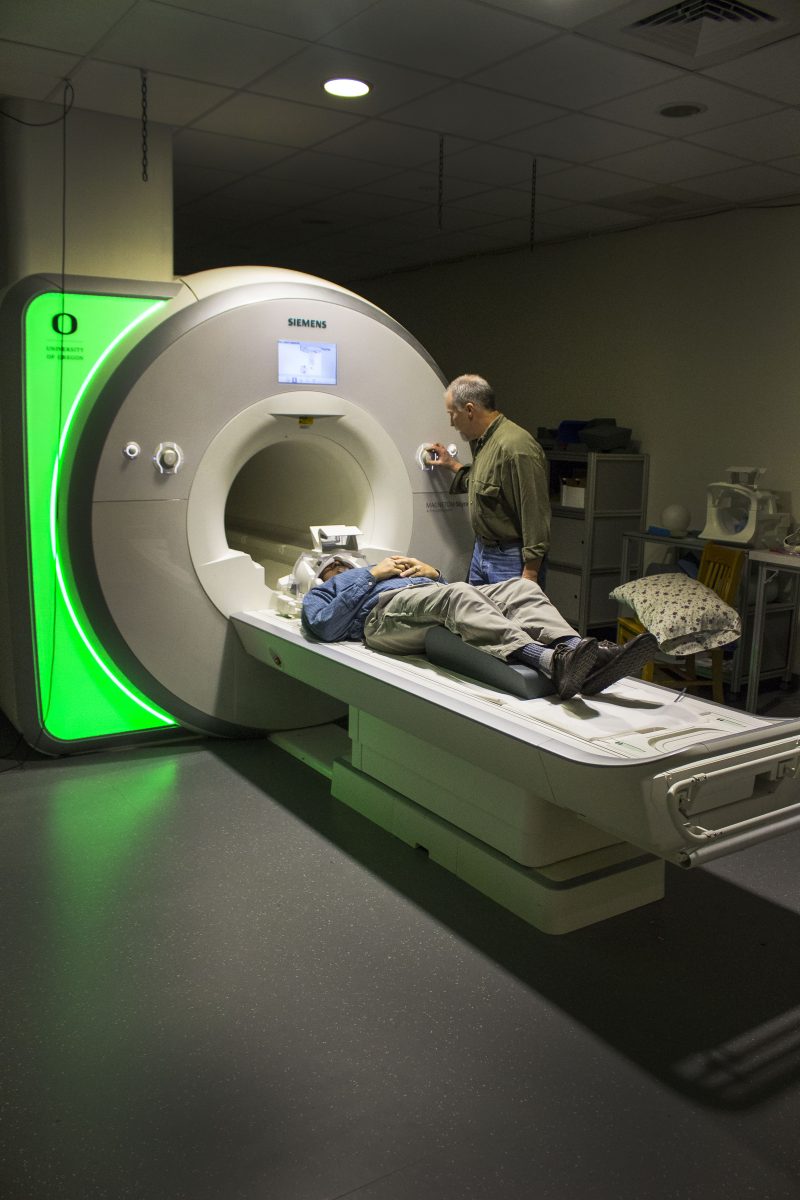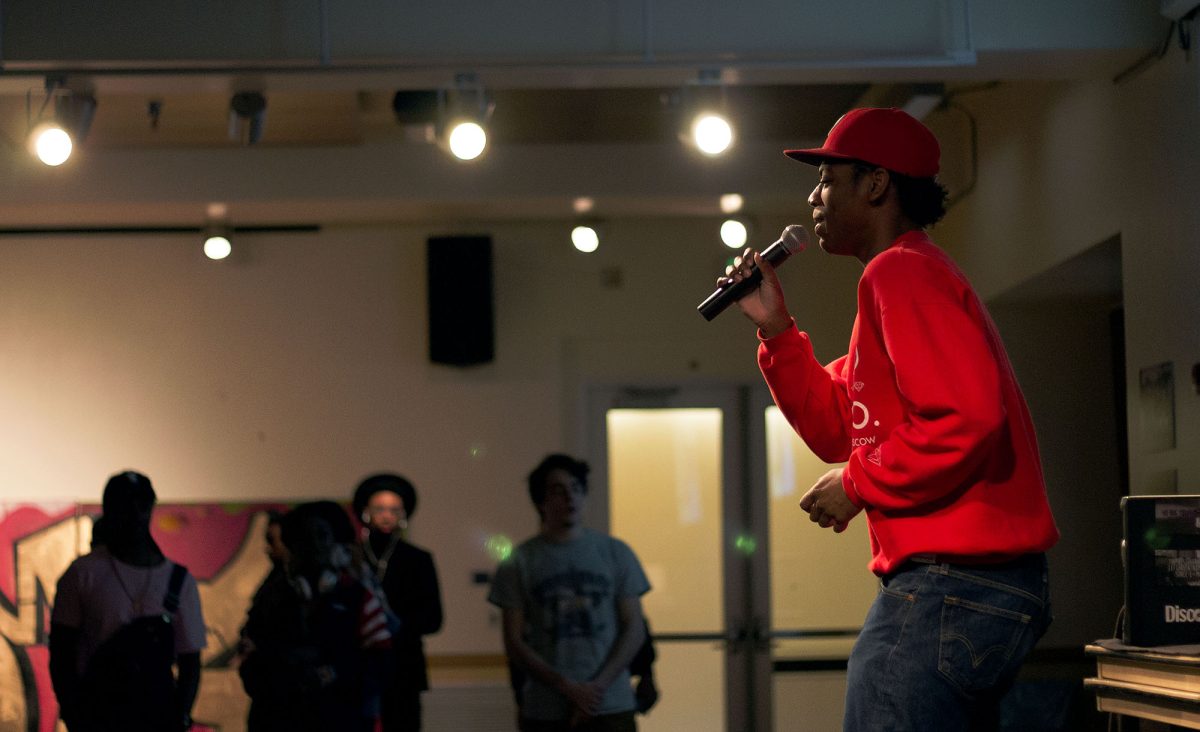Each year the holiday season brings about the gift of giving and the joy that comes with it. Salvation Army bells ring outside of thousands of stores, gift and food drives help the needy, and volunteering at soup kitchens are just some of the ways people give their time or money to help others. But why do people do it? The answer may be more selfish than previously thought, as shown in a recent study conducted by two University of Oregon professors, Dr. William Harbaugh, a professor of economics, and Dr. Ulrich Mayr, professor and Department Head of psychology.
The study, “Neural Responses to Taxation and Voluntary Giving Reveal Motives for Charitable Donations,” published in Science, shows that when someone is altruistic, they are rewarded by their brain. The dopaminergic region of the brain – the brain’s “reward center” according to Harbaugh – releases the powerful chemical neurotransmitter dopamine, making a person feel good. Dopamine is also a hormone and serves several important functions within the body, but is mainly the checmical gatekeeper of the body’s reward-motivated behavior. The dopaminergic system, which is part of the brain that keeps track of positive rewards, is triggered when people donate money or act in an altruistic manner, according to the study.
“When something good happens to you, or you get something good to eat, the reward center of the brain activates,” Harbaugh says. “The brain releases dopamine which makes you feel good. The evolutionary reason for this is that it encourages you to look for good food and so forth,” Harbaugh says.
“It turns out that in humans you can also find that area of the brain activates when you give people money. Obviously they aren’t going to eat the money but they are thinking that they can do something that will make them happy with it. So we showed in this paper that that area is also activated when you told people that you are going to give money to the charity, to the food bank. When you think about it, it’s not obvious that that part of the brain would activate when you just know that somebody else is made better because it’s the part of the brain that was designed – evolved – for helping you figure out what is good for yourself,” Harbaugh says.
Harbaugh and Mayr were able to show that for some people, the reward center of the brain was actually activated more when they gave to other people rather than when they kept the money for themselves. It is the same part of the brain that is activated when someone eats sweets or has sex. They were able to predict who would be more charitable by seeing how the test subject’s brain reward center reacted when they saw others being helped with money they donated.
Harbaugh says, “That part of the brain does activate when you see other people being helped. Then what we did was take the relative amount of brain activation when you got money and compared it to the activation when you see somebody else get money. The people that show more activation seeing the charity get money than when they got money for themselves are more likely to be charitable.”
The research conducted at the University of Oregon couldn’t have been done better anywhere else, according to Harbuagh. “The University has a really exceptionally good brain researching center. Unusually good. So doing the research somewhere else would be very difficult because of the equipment here.” The research that they did would’ve been impossible to do without the use of the University of Oregon’s fMRI (functional magnetic resonance imaging) machine. The machine also happens to have been donated.
The fMRI machine is key to the research process and allows the researchers to see, via images, what parts of the brain are activated when the participants responded to different questions and statements. The fMRI is also able to measure the amount of blood that goes to certain parts of the brain, which helps tell researchers what part of the brain is being activated. However, the research comes at a cost because the machine is very expensive to run, up to $1,000 per person. The expenses associated with the research were initially partially funded by the University of Oregon, and now have been funded by grants from The National Science Foundation and National Institutes For Health.
Harbaugh did acknowledge that he wishes they would’ve been able to dig a little more deeper in his study. He thinks the wording of the study to participants may change the way that the brain reacts. For example, wording the statement that someone’s money is going to charity as, “You are losing X amount of dollars to this charity” versus “You are giving X amount of dollars to this charity” may result in activating and release dopamine in different amounts and possibly effect the brain in a different way. “I think it would definitely have an effect on their brain activity because it has a major effect on their behavior, so there would be at least some difference in brain activity,” Harbaugh says. He also would guess that giving to someone close may trigger a stronger dopamine response than giving to a stranger; this hasn’t yet been confirmed, though.
The study is a couple years old now but Harbaugh and Mayr are going to publish a new study as an update to their research. The original study was done with college aged students and showed that some of them got a lot more reward out of giving than keeping the money for themselves. The new research is done with people ages 20 to 65 to see how their brains react to giving to other people as well.
The research is important because it demonstrates just how flexible the human brain is. Through research, Harbaugh and Mayr discovered the evolution of the brain through social situations. Originally designed to help people discover good food, the brain has evolved to reward itself for good deeds and giving to others. The “reward center” of the brain wasn’t originally designed for social situations, but it has changed over time to fit the needs of humans. Giving is a unique gift that brings joy to many people throughout the world both on the receiving and giving end. The brain is a very flexible entity and will continue to evolve to reward people for different situations. The brain will also continue to send out dopamine and bring good feelings for giving throughout time.
Categories:
No Good Deed Goes Unpunished
February 3, 2015
A study conducted at the University of Oregon shows that our brains like to give – and more than we know.
0
Donate to Ethos
Your donation will support the student journalists of University of Oregon - Ethos. Your contribution will allow us to purchase equipment and cover our annual website hosting costs.
More to Discover


















